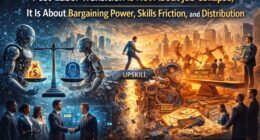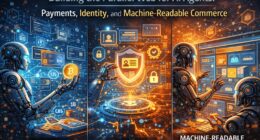To design the foundation of life after AI, focus on building ethical standards, international regulation, and inclusive innovation. Support collaborations between academia, industry, and government to promote responsible development. Foster grassroots initiatives that serve societal and environmental goals. Prioritize transparency, accountability, and public trust. By establishing strong global norms and empowering diverse communities, you can create a resilient future where AI benefits everyone. Keep exploring to learn how these elements come together in shaping our future.
Key Takeaways
- Establish robust AI research ecosystems with sustained funding, talent development, and public-private partnerships.
- Promote ethical AI development through transparent governance, societal benefit focus, and human rights safeguards.
- Develop international standards and regulations to ensure safe, equitable AI deployment worldwide.
- Foster collaboration among academia, industry, nonprofits, and communities to democratize AI benefits.
- Invest in grassroots initiatives and open-source projects to build an inclusive, resilient foundation for an AI-enabled future.

As we move into a future shaped by artificial intelligence, building a strong foundation for life after AI becomes essential. You’ll see that investing in robust AI research ecosystems is a key step. Countries like Finland are establishing new professorships focused on AI, which boosts academic excellence and sparks innovation. These roles attract top talent, fueling progress that benefits society. Public-private partnerships also play a pivotal role, connecting academia, industry, and policymakers to create a dynamic AI environment with lasting impact. Europe, in particular, is making strategic investments to become a global leader in AI research, aiming to enhance competitiveness and influence.
Investing in AI research ecosystems and fostering international collaborations are vital for a sustainable AI-driven future.
You’ll notice that fostering networks of AI fellows encourages knowledge exchange and helps retain talent within research communities. Long-term funding commitments are *crucial* to sustain world-class AI advancements beyond initial breakthroughs, *ensuring* continuous progress. Equally important is advancing AI with a focus on public interest and ethics. Major philanthropies are investing over $200 million to promote responsible AI development, emphasizing harm mitigation and societal benefits. Protecting democracy and human rights guides AI initiatives, aligning technological progress with core societal values. Transparency and accountability in AI processes are prioritized to build public trust, making sure that development remains open and fair.
You’re encouraged to see efforts empowering workers through AI innovations, addressing shifts in the labor market across industries. Building strong international standards and regulations supports ethical global governance, preventing misuse and fostering shared responsibility. Early dialogues, like those from the Rockefeller Foundation, highlight governance challenges and ethical considerations, especially as AI’s capabilities evolve rapidly, demonstrated during COVID-19 with accelerated vaccine development. Open-source AI infrastructures ensure equitable access worldwide, preparing us for future crises.
It is also important to recognize that effective AI regulation can help mitigate risks associated with rapid technological advancement while fostering innovation that aligns with societal values.
Public interest AI communities, supported by funds like the European AI & Society Fund, foster collaboration among over 65 organizations, focusing on projects that serve social and environmental goals. You’ll find initiatives encouraging innovation within public interest AI, creating sustained impact through diverse stakeholder participation. Nonprofits also play a *crucial* role. For example, OpenAI’s $50 million People-First AI Fund backs U.S. nonprofits focusing on education and community engagement, enabling grassroots efforts to expand AI’s societal benefits. These collective efforts are laying the groundwork for a resilient, ethical, and inclusive life after AI.
Top picks for "design foundation life"
Open Amazon search results for this keyword.
As an affiliate, we earn on qualifying purchases.
Frequently Asked Questions
How Will AI Influence Global Economic Inequality?
AI will likely widen global economic inequality, benefiting wealthy nations with better infrastructure and leaving poorer countries behind. You may see richer countries capturing most AI-driven gains, while developing nations struggle to keep up. Digital inclusion can help bridge gaps, but unless access improves, the divide will grow. You should advocate for policies that promote fair AI deployment and infrastructure to guarantee more equitable benefits worldwide.
What Ethical Frameworks Will Guide AI Integration in Daily Life?
You’ll rely on ethical frameworks emphasizing fairness, transparency, and accountability to guide AI integration in daily life. These principles ensure AI systems avoid bias, explain their decisions clearly, and hold responsible parties accountable. You’ll also prioritize human rights and privacy, creating guidelines and oversight committees to monitor AI’s impact. By involving diverse stakeholders and conducting regular audits, you help build trustworthy AI that benefits everyone and respects societal values.
How Can We Ensure AI Respects Cultural Diversity?
Think of AI as a mirror reflecting the world’s diverse cultures; it must show all facets respectfully. You can guarantee AI respects cultural diversity by designing with input from varied communities, training it on inclusive data, and involving cultural experts. Transparency about AI’s limitations and biases also helps. When you actively listen and adapt, you create AI that celebrates differences rather than erases them, fostering genuine understanding and respect across cultures.
What Skills Will Be Most Valuable in an Ai-Driven World?
In an AI-driven world, you’ll find that technical skills like AI literacy, data analysis, programming, and cybersecurity remain essential. Equally important are critical thinking, creativity, and decision-making, helping you evaluate AI outputs and innovate beyond automation. Human-centered skills like emotional intelligence, communication, adaptability, and leadership will set you apart, enabling you to collaborate effectively with AI systems and navigate rapid technological changes confidently.
How Will AI Impact Mental Health and Human Relationships?
Like Icarus flying too close to the sun, relying heavily on AI can risk damaging your human connections. AI can offer support and early detection, but overdependence might lead to increased loneliness, technostress, and emotional detachment. You may find yourself replacing genuine empathy with digital interactions, which could weaken relationships. To balance this, you need to remain mindful of AI’s limits and nurture real human bonds alongside technological benefits.
Conclusion
As you step into this new era, imagine building a sturdy bridge between human spirit and artificial intelligence—each stone laid with care, shaped by your values. The foundation you create now becomes the roots that nourish future life, anchoring hope and resilience. Embrace your role as the architect of tomorrow’s world, where technology blooms like a vibrant garden, and together, you craft a legacy that’s both strong and beautiful—alive with purpose and possibility.









